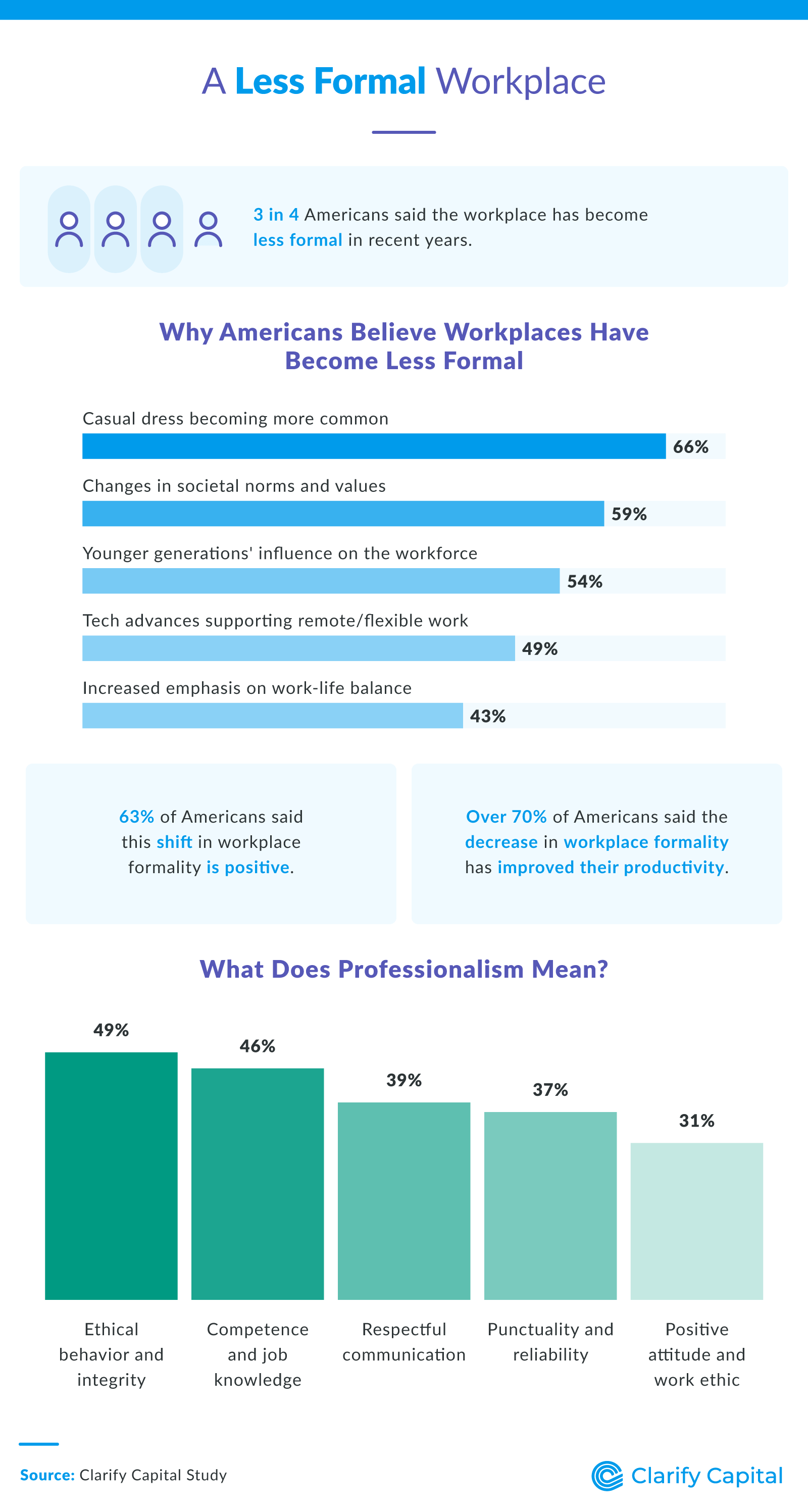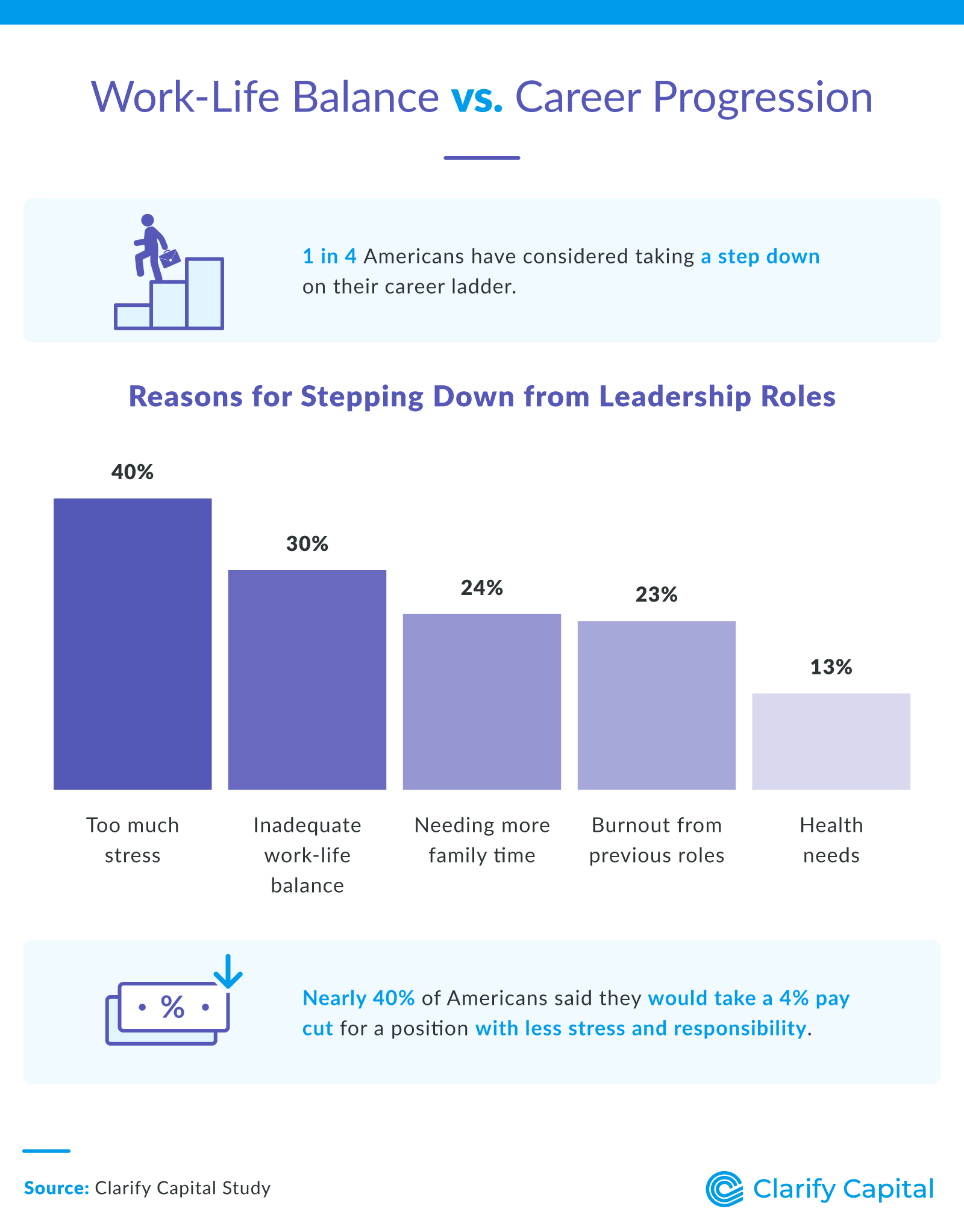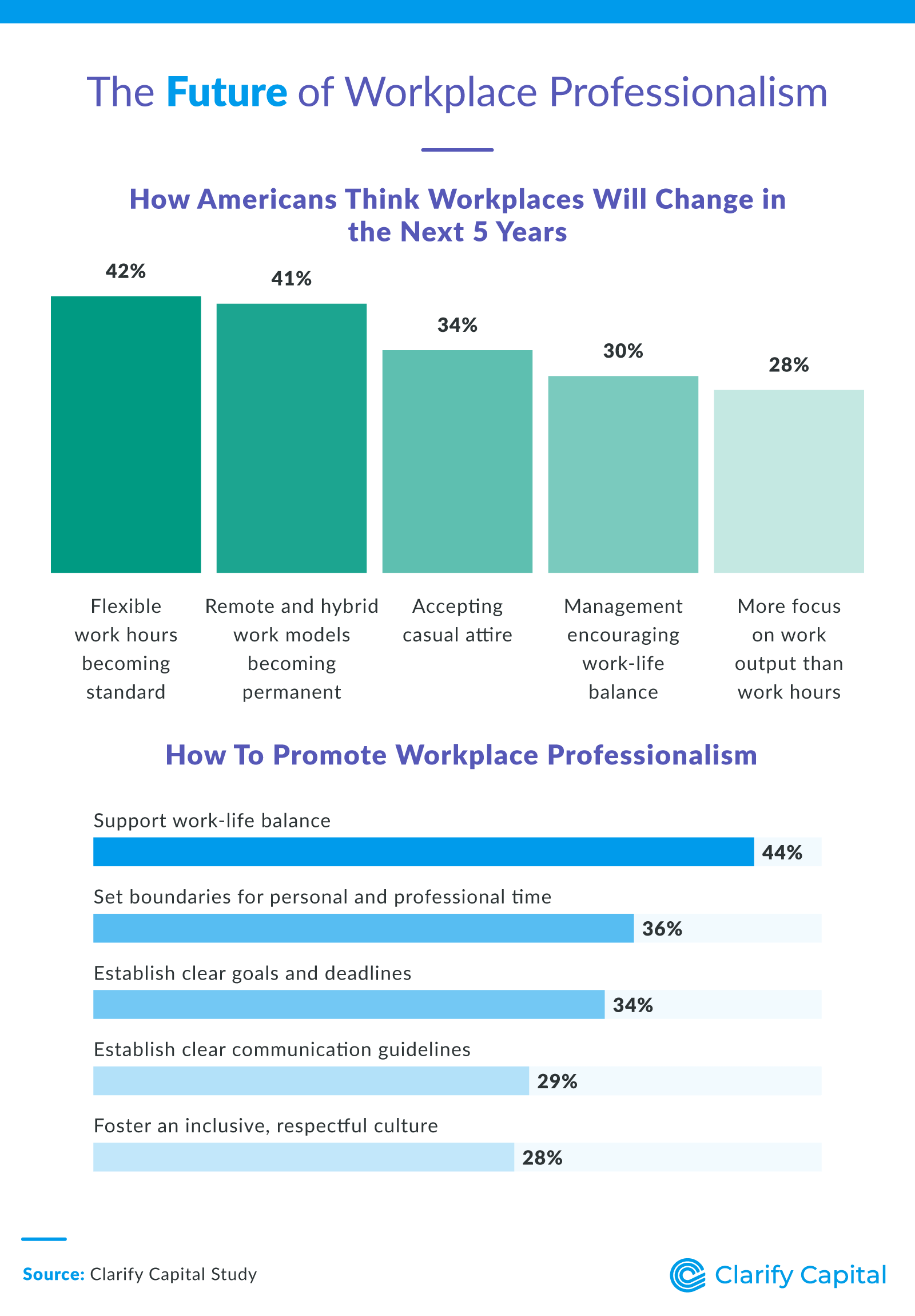Key Takeaways:
3 in 4 Americans believe the workplace has become less formal in recent years.
63% of Americans believe the shift in workplace formality is positive.
Over 70% of Americans say the decrease in workplace formality has improved their productivity.
Ethical behavior and integrity, competence in job knowledge, and respectful communication are the top defining factors of professionalism.
1 in 4 Americans have considered taking a step down in their career ladder, with 40% citing stress as the reason
Nearly 40% of Americans would accept a pay cut of 4% of their annual salary to move into a position with less stress and responsibility.
The Changing Face of Workplace Formality
The workplace has undergone many changes in recent years, including shifting towards a more relaxed and less formal environment. This section explores how Americans perceive these changes and what factors could have driven this shift.

Three-quarters of Americans noted that the workplace has become less formal recently. Women may have felt this change a bit more acutely at 79%, compared to 74% of men. Older generations were more likely to have noticed it, too. Gen Xers were the most likely to agree with the sentiment (84%), followed by baby boomers (83%), millennials (77%), and Gen Z (67%). The shift was also evident across different work situations, with remote workers noticing it the most (82%), followed by hybrid (79%) and in-person (71%) workers.
Several factors could have contributed to this trend. A widening acceptance of casual dress codes was cited by 66% of respondents, while 59% attributed it to changes in societal norms and values. Younger generations’ influence on the workplace was noted by 54%, and 49% pointed to technological advancements that support remote and flexible work. Another 43% mentioned a greater emphasis on work-life balance as a key reason.
Most Americans (63%) viewed the shift to less formal workplaces as a good thing. Over 70% reported that it’s even boosted their productivity, and 60% said it has improved their work quality. Despite the relaxed atmosphere, ethical behavior and integrity, along with competence and respectful communication, were the top ways respondents defined professionalism.
Americans Stepping Down in Their Careers
Many Americans are reassessing their career paths. We found out some of the reasons behind the trend of stepping down the career ladder and how prevalent it is.

A quarter of Americans have thought about taking a step down in their career, and 15% have already done it. The primary reasons were to reduce stress (40%), find a better work-life balance (30%), and have more time for family (24%). Burnout from previous roles was the reason for 23% of those who stepped down, and another 13% cited health reasons.
Some would even prioritize these goals above maintaining their pay grade. Nearly 40% of Americans told us they’d accept a pay cut of 4% of their annual salary to transition into a position with less stress and responsibility. This mirrors a growing desire in America for roles that prioritize personal well-being over high pay and lots of responsibility.
This shifting desire would also align with the fact that nearly half of the Americans we surveyed said that senior leadership roles come with stress and challenges as part of the job. In contrast, 19% of those in leadership positions felt that they could avoid or reduce these issues by taking on a similar role at another company.
Future Workplace Etiquette
This section explores how changing definitions of professionalism and other factors influence recruitment, workplace practices, and the future of work.

We asked respondents, “How has the generational gap in definitions of professionalism affected job hunting and hiring practices?” These were the Top 5 replies:
Differences in the use of technology and social media in recruitment: 27%
Challenges in aligning work-life balance expectations: 26%
Discrepancies in valuing certain skills or experiences (e.g., formal education vs. practical experience): 25%
Diverse attitudes towards flexibility and remote work arrangements: 23%
Varied preferences for in-person versus virtual interview processes: 21%
These generational differences in defining professionalism could create recruitment challenges by making it harder to align expectations and preferences across technology use, work-life balance, valued skills, flexibility, and interview methods.
Respondents suggested several ways to maintain professionalism in today’s evolving workplace. Promoting a healthy work-life balance was the top recommendation at 44%. Setting boundaries for personal and professional time followed at 36%, while 34% emphasized the importance of establishing clear goals and deadlines. Clear communication guidelines were advised by 29%, and fostering an inclusive and respectful culture was noted by 28%.
Employees and executive leaders had differing views on how workplace formality will continue to evolve. Some employees predicted that flexible work hours and remote or hybrid work models will become standard (both at 42%) or that casual attire will become even more widely accepted (34%). They also foresaw a stronger emphasis on work-life balance (31%) and a focus on work output rather than hours spent in the office (30%).
Many executives, on the other hand, said they expect a more pronounced shift towards flexible work hours (55%) and more employers encouraging work-life balance (42%). Some anticipated an increased focus on work output versus office hours (39%) or the permanence of remote and hybrid work models (39%). Another 24% foresaw a decrease in formal in-person business events in favor of virtual networking.
Evolving Professionalism
The evolving definitions of professionalism are reshaping the workplace, creating both challenges and opportunities for job seekers and employers. Our study revealed how changes in workplace norms affect recruitment practices, work-life balance expectations, valued skills, flexibility preferences, and interview methods. Clear communication, setting boundaries, and fostering an inclusive culture that prioritizes work-life balance are becoming increasingly important aspects of the workplace. Embracing these changes can lead to a more flexible, balanced, and productive work environment for everyone.
Methodology
We surveyed 1,000 Americans to explore how changes in workplace formality have influenced perceptions of professionalism among American employees. The average age of respondents was 38, and they comprised 49% males and 51% females. Their generational makeup included 8% baby boomers, 23% Gen X, 48% millennials, and 21% Gen Z.
About Clarify Capital
Clarify Capital gives financial backing to small businesses, offering up to $5 million in no-doc business loans and fast business loans with competitive rates and quick processing times. We personalize the lending experience and help entrepreneurs advance their business goals.
Fair Use Statement
Help us spread the knowledge! Share these findings non-commercially and link back to this article to give your audience more insights.

Bryan Gerson
Co-founder, Clarify
Bryan has personally arranged over $900 million in funding for businesses across trucking, restaurants, retail, construction, and healthcare. Since graduating from the University of Arizona in 2011, Bryan has spent his entire career in alternative finance, helping business owners secure capital when traditional banks turn them away. He specializes in bad credit funding, no doc lending, invoice factoring, and working capital solutions. More about the Clarify team →
Related Posts





